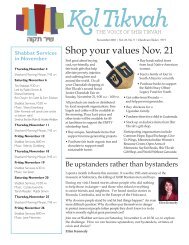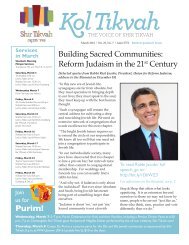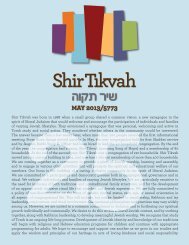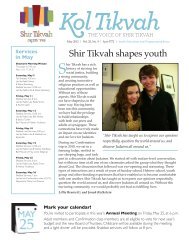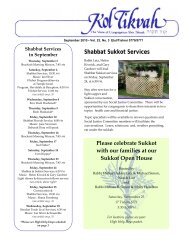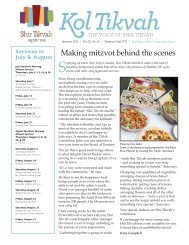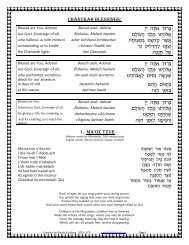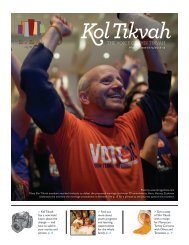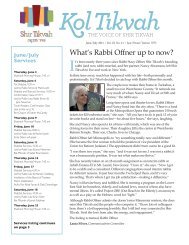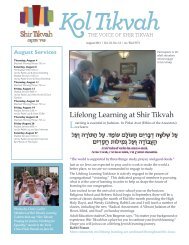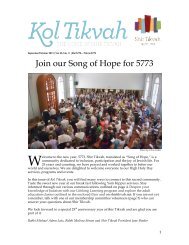Installation Sermon December 5 2009 - Shir Tikvah
Installation Sermon December 5 2009 - Shir Tikvah
Installation Sermon December 5 2009 - Shir Tikvah
You also want an ePaper? Increase the reach of your titles
YUMPU automatically turns print PDFs into web optimized ePapers that Google loves.
private; Torah is lifted before the congregation, in community. So, too, with us. We must lift<br />
each other. We must support each other as we try the heavy lifting of study, tradition, ritual,<br />
and the pursuit of justice. In our holy congregation, we must also create space for others to see<br />
the uplifted scroll, to move to the side or adjust ourselves, so others, too, might see their own<br />
reflection in the radiance of Torah. The 19 th century Hasidic rabbi, Menachem Mendl of Kotzk<br />
— known as the Kotzker Rebbe—taught, “The giving of the Torah took place in the month of<br />
Sivan, but the receiving of the Torah takes place every day. The giving of the Torah was the<br />
same for everyone, but the receiving is different for each person according to his ability to<br />
understand.” (Emet Ve-Emunah).<br />
Hagbah is a call to each of us: to expose the treasures of our tradition for all to share, to learn, to<br />
seek inspiration and comfort and guidance in a world that is ever more spiritually sublime and<br />
morally complex.<br />
As a rabbi in the 21 st century—nearly 2000 years since the first rabbi was ordained—my central<br />
religious task remains as precious as it was for the students in the first seminary in Yavneh two<br />
millennia ago: To cultivate a community committed to lifelong Torah study and spiritual<br />
inquiry, to ethical and compassionate living. As our congregation’s spiritual leader, my<br />
responsibility is to call us to examine in a very practical way, how we organize our congregation,<br />
our learning, our priorities, and our resources, to lift up Torah for every soul who wishes to<br />
encounter it, who seeks a Jewish life of promise and purpose.<br />
My prayer is that our engagement with Torah will inspire great Jewish self confidence, an<br />
increased passion and commitment to lifelong Jewish learning, a smoldering prioritization to<br />
connect with community, and an unyielding commitment to justice and righteousness. As we<br />
breathe Torah to life when we chant its words, we make manifest the central mitzvot of our rich<br />
Jewish tradition and heritage: the observance of Shabbat and holy time; the Oneness of the<br />
universe and the embracing Divine Presence; the mystery of human relationships; the clarion call<br />
to care for the widow, the orphan, the poor, and the strangers in our midst. As we gather on<br />
Shabbat and raise the Torah, we proclaim a Jewish future robust with vigor and vitality. For Rav<br />
Kook proclaimed, the old shall be renewed, and the new shall be made holy.<br />
This probing study and observance of Jewish time is not merely because it enriches our souls<br />
and gives our lives meaning—though it certainly does that! Over the past two decades, led by<br />
the indefatigable Rabbi Offner, <strong>Shir</strong> <strong>Tikvah</strong> created an expansive community of radical<br />
inclusion. When asked the timeless question: Are we our brother and our sister’s keeper? <strong>Shir</strong><br />
<strong>Tikvah</strong> repeatedly answered without equivocation, “YES! We are our brother’s keeper. We are<br />
our sister’s keeper!” Time and again, on the great moral and social issues of the day—from<br />
Darfur to the treatment of Somali Refugees here in the Twin Cities, from AIDS to homelessness,<br />
from Domestic Violence to Environmental Justice—<strong>Shir</strong> <strong>Tikvah</strong> has led the way for justice. Our<br />
prayer and our study compel us to act in the world, to make God’s mitzvot and the Prophet’s<br />
vision real: to make justice roll down like waters and righteousness as a mighty stream!<br />
In our parsha this Shabbat, in the dark of night, Jacob wrestles with beings Divine and human.<br />
Confronted with the demons of his past and the truths of his life, Jacob becomes Israel. We do<br />
not become without struggle. Pain and suffering are seemingly part of the bargain for being<br />
human. An authentic religious enterprise seeks to end the suffering of God’s creation where



